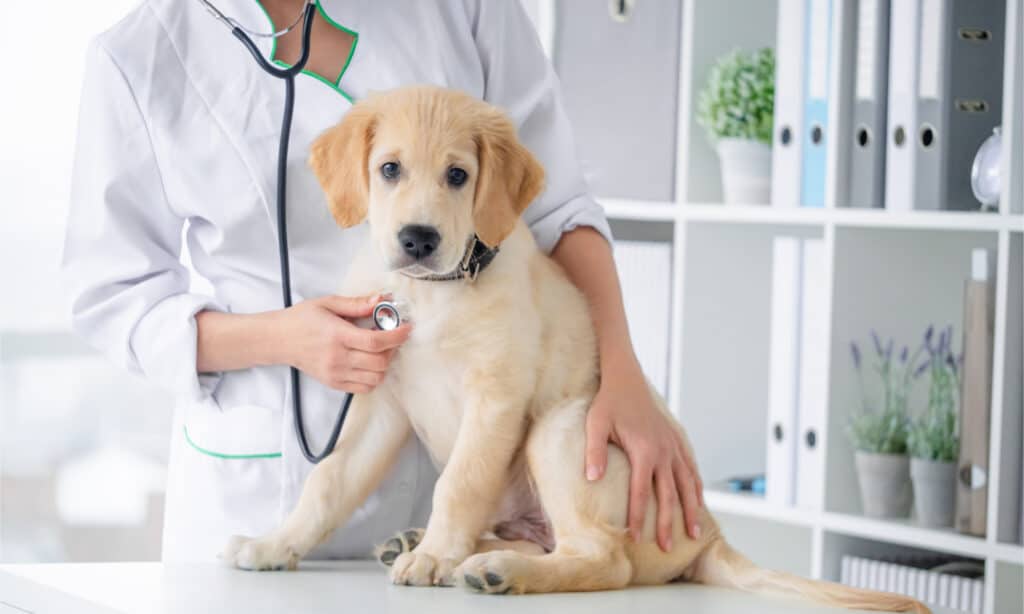Why Do Dogs Shake, Actually?
@media (min-width: 481px) {
.mobile-top-content {
display: none;
}
}
#mobileTopContentCTACarouselControls { overflow: hidden; text-overflow: ellipsis; white-space: nowrap; }
.mobile-top-content .more { color: #fff; }
.mobile-top-content a { color: #fff; text-decoration: underline; }
.mobile-top-content a:hover { color: #fff; text-decoration: underline; }
@media (max-width: 480px) {
.mobile-top-content {
background-color: #06a10b;
color: #fff;
text-align: center;
/*height: 60px;
padding-top:5px;*/
font-size:80%;
/* display: block; */
margin: 0px -30px;
}
}
Shivering and trembling are fairly common dog behaviors but they can look quite alarming if you are not used to them and don’t know what is causing them. So, why do dogs shake? There are a number of different reasons that range from excitement to illness. Most are perfectly harmless but some are an indication that something is wrong.
Read on for a list of possible explanations for why your dog is shaking. We’ve included some top tips on what you can do to help your pooch out if you find that they are shaking.
Why Do Dogs Shake?
There are many different types of dog shaking. We’ve all seen the whole-body shake when a dog gets wet. They are clearly trying to get rid of the excess water from their coat. Also, most of us have seen a head shake, when they have an itchy ear! But what about other types of shaking.
button.pulse {
transform: scale(1); animation: pulse 2s infinite;
box-shadow: 0 0 0 0 rgba(11, 247, 25, 1);
}
@keyframes pulse {
0% { transform: scale(0.90); box-shadow: 0 0 0 0 rgba(11, 247, 25, 0.5); }
60% { transform: scale(1); box-shadow: 0 0 0 15px rgba(11, 247, 25, 0); }
100% { transform: scale(0.90); box-shadow: 0 0 0 0 rgba(11, 247, 25, 0); }
}
Dogs shake because of emotion (behavioral shaking), as a response to the environment (environmental shaking), or because they have a health issue (medical shaking). Let’s unpack each of these.
Behavioral Shaking
Behavioral shaking is connected to your dog’s emotions. These can be positive or negative but they both trigger a hormonal response that makes the muscles contract and relax rapidly which results in the physiological response of shaking. It’s part of the ancient fight or flight response. Your dog detects a threat and its brain tells its body to start producing the hormones cortisol and adrenaline. Their heart beats faster, they breathe faster, their pupils dilate – and they shake! The stimulus can be positive or negative.
Excitement
A positive stimulus is something that makes your dog excited or that makes them think that something exciting is about to happen (anticipation). This can be triggered by you playing with them or by you coming home when you have been out all day.
It is best to calm down this type of excitement if you can. For dogs that suffer from separation anxiety and get too excited when you come home, you could try leaving an interactive toy while you are away. This will keep their mind occupied. When you come home, try offering them a chew toy to focus on while they calm down.
Anxiety and Fear
A negative stimulus of shaking would cause high levels of adrenaline to be released by the body to prepare the muscles for defense (fight) or running away (flight). This makes them shake. It is often triggered by fireworks and thunderstorms. Stressed dogs usually have other symptoms too such as panting and whimpering. You may find that playing some calming music helps. Distracting them with a game of fetch may help too. If things are really bad, you may need to ask your vet if your dog can have some anti-anxiety medication.

Lindsay Helms/Shutterstock.com
Environmental shaking
Just like all other animals, dogs have evolved over thousands of years to respond to challenges in the environment. This has helped them to survive the constantly changing conditions that nature throws at them. Here are the most common examples.
To Remove Water
This is probably the single most common form of shaking and all dogs do it. It is a highly effective way of removing water from their coat. If you have ever stood close to a wet dog shaking itself, you will know how much water they can remove with just a few shakes because a lot of it will have landed on you!
But, why are dogs so worried about being wet? It’s because their coat is highly insulating. It traps air to keep them warm but it also traps water. A wet coat is not good at keeping the heat inside their body and so a wet dog will soon get chilled. This is why cooling vests for dogs work so well. If you are in an environment where your dog shaking muddy water all over the place would be a problem, you could invest in one of the highly absorbent dog towels.
To Warm Up
Dogs shiver as a way to warm up. The muscles contract and relax rapidly which generates heat and raises their core temperature. You’re most likely to see this in smaller dogs that have thin coats and therefore struggle to keep warm as temperatures drop.
The only way around this is to wrap your dog up in a warm coat before you head out. Warm booties are also a great idea. When at home, make sure that they have a warm and cozy bed, or even a heated dog bed, located away from draughts with a few extra dog blankets for them to snuggle up to.

Alex_Zh/Shutterstock.com
Medical Causes of Shaking
Sometimes, shaking is an indication that something is wrong. Here are some of the main medical causes of shaking in dogs.
Pain
Pain can be the result of an injury or an illness. If the shaking is caused by pain, there will probably be other symptoms at the same time. You may notice that your dog has flattened their ears and is not its usual happy self. They may be obsessed with a particular part of their body (licking and biting it) and this may indicate where the source of the problem is. You should contact your vet so that they can examine your dog and work out what is causing the problem.
Old Age
Older dogs can shake when they are tired. You may notice this after they have been out for a long run, especially if they are not used to doing a lot of exercise. Don’t just dismiss this as age-associated muscle weakness, you should get your vet to check that your senior dog is not also in pain. There are special senior dog foods that help to support older dogs with issues like arthritis of the joints.
Nausea
Feeling nauseous is not great fun for dogs in the same way as for humans. If they feel like they are going to vomit, they can start licking their lips and drooling and seem to be swallowing a lot. They can also shake.
Nausea in dogs has many possible causes. They may have simply eaten too much too quickly, in which case you may need a slow feeder dog bowl to help them eat calmly. It could be a food sensitivity and you may need to swap them onto a dog food for allergies. It could even be motion sickness in which case a dog travel crate may help to make the journey less messy!
Poisoning
This is one of the serious potential causes of shaking. Dogs can get poisoned by loads of different substances around the home and when they are out and about. Poisons that often make a dog shake and twitch include chocolate, cannabis, slug poison, and cigarette butts.
You may want to use a head halter to prevent your dog from diving after garbage in the gutter. If you suspect that your dog has ingested poison, you must get them to a vet straight away.
What Diseases Can Cause Shaking In Dogs?
There are some medical conditions that can make dogs shake. These always need to be checked out by a vet. Some require long-term treatment.
Neurological Conditions
These are conditions that affect the brain and nervous system. They cause seizures (shaking) which can be mild tremors or major convulsions that affect the whole of the body. These can occur in dogs of all ages. Some dogs are born with them, but others develop them as they grow. Here are some examples:
- Cerebellar Hypoplasia. Part of the brain called the cerebellum that controls coordination and how some muscles move does not develop properly. It becomes obvious in young pups as they start to try to stand up. Their head also bobs around and they fall over. It is most common in Chows Chows and Airedale Terriers but is also seen in other breeds.
- Shaker Syndrome. You will also see this called generalized tremor syndrome (GTS). It is caused by inflammation (swelling) of the central nervous system (brain and spinal cord) and makes the whole body shake. It is seen most often in young and middle aged Maltese and West Highland Terriers.
- Shaking Puppy Syndrome. This is also called hypomyelination, and can be seen in pups of just two weeks. It is caused by a problem with the protective layer around nerves (myelin sheath). As well as shaking, the affected pups have problems with coordination and standing. It is most common in male Welsh Springer Spaniels, and male Samoyeds, and in both sexes of Chow Chows and Weimaraners, but other breeds can also be affected
- Epilepsy. This is the most common neurological condition in dogs and it causes repeated seizures. It varies in how severe it is and sadly can cause death in some dogs. However, it is also possible to control it in other dogs with the correct medication.

In Green/Shutterstock.com
Other Diseases And Conditions That Cause Shaking
Shaking can also be caused by a number of other conditions.
- Addison’s disease. This is also caused Hypoadrenocorticism and affects the hormones normally produced by the body. As well as shaking, it causes lethargy and vomiting.
- Hypocalcemia. In this condition, dogs have a lack of calcium. You can play your part in ensuring that your dog has all the minerals they need by feeding them a high quality dog food.
- Hypoglycemia. This is where the blood sugar level is too low. It causes shaking and twitching. Dogs with diabetes have trouble controlling their blood sugar levels and your vet may need to give them medication. You may also be asked to transition them to a special dog food for diabetic dogs.
- Distemper. This is an infectious disease caused by a virus. It’s most often seen in younger dogs that have not been vaccinated. As well as shaking, dogs with distemper usually have a discharge from the eyes and nose and a cough.
What Should You Do When Your Dog Shakes?
Start by trying to identify the cause. Is there an obvious cause of excitement or fear? Is your dog wet or cold? These are things that you can rectify yourself by following the advice above.
However, if you suspect that your dog has poisoning or an injury, you must take them to the vet. Also, if your dog feels cold to the touch or has any other symptoms as well as shaking, you must call your vet right away.
Ready to discover the top 10 cutest dog breeds in the entire world?
How about the fastest dogs, the largest dogs and those that are — quite frankly — just the kindest dogs on the planet? Each day, AZ Animals sends out lists just like this to our thousands of email subscribers. And the best part? It’s FREE. Join today by entering your email below.
More from A-Z Animals
.more-snake-card-image { max-height:140px !important; }
@media (min-width: 481px) {
.mobile-top-content {
display: none;
}
}
#mobileTopContentCTACarouselControls { overflow: hidden; text-overflow: ellipsis; white-space: nowrap; }
.mobile-top-content .more { color: #fff; }
.mobile-top-content a { color: #fff; text-decoration: underline; }
.mobile-top-content a:hover { color: #fff; text-decoration: underline; }
@media (max-width: 480px) {
.mobile-top-content {
background-color: #06a10b;
color: #fff;
text-align: center;
/*height: 60px;
padding-top:5px;*/
font-size:80%;
/* display: block; */
margin: 0px -30px;
}
}
Shivering and trembling are fairly common dog behaviors but they can look quite alarming if you are not used to them and don’t know what is causing them. So, why do dogs shake? There are a number of different reasons that range from excitement to illness. Most are perfectly harmless but some are an indication that something is wrong.
Read on for a list of possible explanations for why your dog is shaking. We’ve included some top tips on what you can do to help your pooch out if you find that they are shaking.
Why Do Dogs Shake?
There are many different types of dog shaking. We’ve all seen the whole-body shake when a dog gets wet. They are clearly trying to get rid of the excess water from their coat. Also, most of us have seen a head shake, when they have an itchy ear! But what about other types of shaking.
button.pulse {
transform: scale(1); animation: pulse 2s infinite;
box-shadow: 0 0 0 0 rgba(11, 247, 25, 1);
}
@keyframes pulse {
0% { transform: scale(0.90); box-shadow: 0 0 0 0 rgba(11, 247, 25, 0.5); }
60% { transform: scale(1); box-shadow: 0 0 0 15px rgba(11, 247, 25, 0); }
100% { transform: scale(0.90); box-shadow: 0 0 0 0 rgba(11, 247, 25, 0); }
}
Dogs shake because of emotion (behavioral shaking), as a response to the environment (environmental shaking), or because they have a health issue (medical shaking). Let’s unpack each of these.
Behavioral Shaking
Behavioral shaking is connected to your dog’s emotions. These can be positive or negative but they both trigger a hormonal response that makes the muscles contract and relax rapidly which results in the physiological response of shaking. It’s part of the ancient fight or flight response. Your dog detects a threat and its brain tells its body to start producing the hormones cortisol and adrenaline. Their heart beats faster, they breathe faster, their pupils dilate – and they shake! The stimulus can be positive or negative.
Excitement
A positive stimulus is something that makes your dog excited or that makes them think that something exciting is about to happen (anticipation). This can be triggered by you playing with them or by you coming home when you have been out all day.
It is best to calm down this type of excitement if you can. For dogs that suffer from separation anxiety and get too excited when you come home, you could try leaving an interactive toy while you are away. This will keep their mind occupied. When you come home, try offering them a chew toy to focus on while they calm down.
Anxiety and Fear
A negative stimulus of shaking would cause high levels of adrenaline to be released by the body to prepare the muscles for defense (fight) or running away (flight). This makes them shake. It is often triggered by fireworks and thunderstorms. Stressed dogs usually have other symptoms too such as panting and whimpering. You may find that playing some calming music helps. Distracting them with a game of fetch may help too. If things are really bad, you may need to ask your vet if your dog can have some anti-anxiety medication.

Lindsay Helms/Shutterstock.com
Environmental shaking
Just like all other animals, dogs have evolved over thousands of years to respond to challenges in the environment. This has helped them to survive the constantly changing conditions that nature throws at them. Here are the most common examples.
To Remove Water
This is probably the single most common form of shaking and all dogs do it. It is a highly effective way of removing water from their coat. If you have ever stood close to a wet dog shaking itself, you will know how much water they can remove with just a few shakes because a lot of it will have landed on you!
But, why are dogs so worried about being wet? It’s because their coat is highly insulating. It traps air to keep them warm but it also traps water. A wet coat is not good at keeping the heat inside their body and so a wet dog will soon get chilled. This is why cooling vests for dogs work so well. If you are in an environment where your dog shaking muddy water all over the place would be a problem, you could invest in one of the highly absorbent dog towels.
To Warm Up
Dogs shiver as a way to warm up. The muscles contract and relax rapidly which generates heat and raises their core temperature. You’re most likely to see this in smaller dogs that have thin coats and therefore struggle to keep warm as temperatures drop.
The only way around this is to wrap your dog up in a warm coat before you head out. Warm booties are also a great idea. When at home, make sure that they have a warm and cozy bed, or even a heated dog bed, located away from draughts with a few extra dog blankets for them to snuggle up to.

Alex_Zh/Shutterstock.com
Medical Causes of Shaking
Sometimes, shaking is an indication that something is wrong. Here are some of the main medical causes of shaking in dogs.
Pain
Pain can be the result of an injury or an illness. If the shaking is caused by pain, there will probably be other symptoms at the same time. You may notice that your dog has flattened their ears and is not its usual happy self. They may be obsessed with a particular part of their body (licking and biting it) and this may indicate where the source of the problem is. You should contact your vet so that they can examine your dog and work out what is causing the problem.
Old Age
Older dogs can shake when they are tired. You may notice this after they have been out for a long run, especially if they are not used to doing a lot of exercise. Don’t just dismiss this as age-associated muscle weakness, you should get your vet to check that your senior dog is not also in pain. There are special senior dog foods that help to support older dogs with issues like arthritis of the joints.
Nausea
Feeling nauseous is not great fun for dogs in the same way as for humans. If they feel like they are going to vomit, they can start licking their lips and drooling and seem to be swallowing a lot. They can also shake.
Nausea in dogs has many possible causes. They may have simply eaten too much too quickly, in which case you may need a slow feeder dog bowl to help them eat calmly. It could be a food sensitivity and you may need to swap them onto a dog food for allergies. It could even be motion sickness in which case a dog travel crate may help to make the journey less messy!
Poisoning
This is one of the serious potential causes of shaking. Dogs can get poisoned by loads of different substances around the home and when they are out and about. Poisons that often make a dog shake and twitch include chocolate, cannabis, slug poison, and cigarette butts.
You may want to use a head halter to prevent your dog from diving after garbage in the gutter. If you suspect that your dog has ingested poison, you must get them to a vet straight away.
What Diseases Can Cause Shaking In Dogs?
There are some medical conditions that can make dogs shake. These always need to be checked out by a vet. Some require long-term treatment.
Neurological Conditions
These are conditions that affect the brain and nervous system. They cause seizures (shaking) which can be mild tremors or major convulsions that affect the whole of the body. These can occur in dogs of all ages. Some dogs are born with them, but others develop them as they grow. Here are some examples:
- Cerebellar Hypoplasia. Part of the brain called the cerebellum that controls coordination and how some muscles move does not develop properly. It becomes obvious in young pups as they start to try to stand up. Their head also bobs around and they fall over. It is most common in Chows Chows and Airedale Terriers but is also seen in other breeds.
- Shaker Syndrome. You will also see this called generalized tremor syndrome (GTS). It is caused by inflammation (swelling) of the central nervous system (brain and spinal cord) and makes the whole body shake. It is seen most often in young and middle aged Maltese and West Highland Terriers.
- Shaking Puppy Syndrome. This is also called hypomyelination, and can be seen in pups of just two weeks. It is caused by a problem with the protective layer around nerves (myelin sheath). As well as shaking, the affected pups have problems with coordination and standing. It is most common in male Welsh Springer Spaniels, and male Samoyeds, and in both sexes of Chow Chows and Weimaraners, but other breeds can also be affected
- Epilepsy. This is the most common neurological condition in dogs and it causes repeated seizures. It varies in how severe it is and sadly can cause death in some dogs. However, it is also possible to control it in other dogs with the correct medication.

In Green/Shutterstock.com
Other Diseases And Conditions That Cause Shaking
Shaking can also be caused by a number of other conditions.
- Addison’s disease. This is also caused Hypoadrenocorticism and affects the hormones normally produced by the body. As well as shaking, it causes lethargy and vomiting.
- Hypocalcemia. In this condition, dogs have a lack of calcium. You can play your part in ensuring that your dog has all the minerals they need by feeding them a high quality dog food.
- Hypoglycemia. This is where the blood sugar level is too low. It causes shaking and twitching. Dogs with diabetes have trouble controlling their blood sugar levels and your vet may need to give them medication. You may also be asked to transition them to a special dog food for diabetic dogs.
- Distemper. This is an infectious disease caused by a virus. It’s most often seen in younger dogs that have not been vaccinated. As well as shaking, dogs with distemper usually have a discharge from the eyes and nose and a cough.
What Should You Do When Your Dog Shakes?
Start by trying to identify the cause. Is there an obvious cause of excitement or fear? Is your dog wet or cold? These are things that you can rectify yourself by following the advice above.
However, if you suspect that your dog has poisoning or an injury, you must take them to the vet. Also, if your dog feels cold to the touch or has any other symptoms as well as shaking, you must call your vet right away.
Ready to discover the top 10 cutest dog breeds in the entire world?
How about the fastest dogs, the largest dogs and those that are — quite frankly — just the kindest dogs on the planet? Each day, AZ Animals sends out lists just like this to our thousands of email subscribers. And the best part? It’s FREE. Join today by entering your email below.














